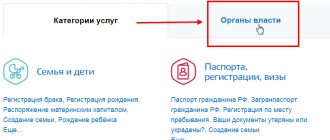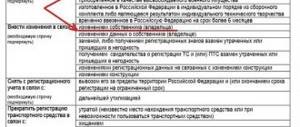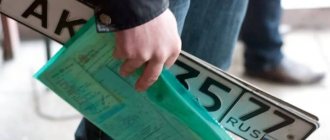Car fines – what does the law say?
The first thing that is important to note in our question is that there cannot be fines on a car. Any penalties are applied to the person - the driver or owner of this car. It’s just that in the traffic police database such sanctions are designated within the framework of violations committed on a specific vehicle. But these sanctions do not belong to the car, but to the driver or owner.
There can be no fines on the car.
However, if there are debts from the previous owner of the used car you bought secondhand, you may encounter problems.
Checking unpaid sanctions
Everything is clear with the procedure for registering a vehicle, since there is nothing complicated here, but the question arises: can they refuse to register a car due to unpaid fines?
In practice, this happens quite often. However, it should be immediately clarified that law enforcement agency inspectors do not have the right to refuse registration actions if there are outstanding sanctions, especially if they were left unpaid by the seller or former owner. In this case, you need to consider how the debt check is performed:
- upon submission of documentation, the necessary registration actions with the car begin;
- in the process, after the driver passes the diagnostic platform and receives a mark on the card, a check is performed for the presence of sanctions;
- a more thorough check of the vehicle owner, as well as the car itself, is carried out subsequently;
- when making a corresponding entry in the STS, as well as issuing a new passport for the car, the presence or absence of fines is revealed;
- subsequently, when the car owner must receive documents, he is given a waiver and given receipts to pay the sanctions.
Such actions by law enforcement officers are unlawful; this is the answer to the question of whether it is possible to re-register a car with fines from the old owner.
The new owner of the car, in accordance with the provisions of this legislation, is not obliged to pay the sanctions imposed on the car before acquiring it. In other words, if there are outstanding debts, they are collected in a different manner.
At the same time, inspectors cannot interfere with registration actions, provided that, with the exception of sanctions, there are no more violations.
But if you still want to find out for sure whether there are fines and other restrictions on the car, use our service at the link https://avtoved.com/servis/restricted.php
What are the penalties for the previous owner?
There are two main risks associated with seller debt:
- prohibition of car registration,
- seizure of the vehicle.
To begin with, we offer you a quick answer depending on your situation with an online test.
You will also be interested in:
- Is it possible and how to buy a credit car correctly?
- How to check whether the previous owner removed the car from the traffic police register?
- How to buy a used car legally?
I bought a car, it has fines from the previous owner - what should I do?
1. Have you already re-registered the car in your name with the traffic police?
Not really
2. Check on the website of the traffic police or bailiffs to see if there is a registration ban?
There is a ban There is no ban
3. Look at the date of the ban - was it imposed before the purchase of the car (the date in the sales contract) or after?
Before after
You don't have to worry! There is no need to pay the fines of the previous owner - these are the debts of the previous owner, and not yours and not the cars. Go through again
You need to re-register the vehicle as soon as possible to the new owner - you, before the bailiffs impose a ban due to the previous owner. Go through again
Unfortunately, this is the worst case scenario. Such a ban can be lifted only if the previous owner of the car or you pay all the fines on the car. Also, such a ban may result in the seizure of the vehicle. Go through again
You need to contact the bailiff who imposed the ban with an application to lift it on the basis that on the date of imposition the car had already left the property of the previous owner. Read more... Go through again
Legality of demands for payment of fines
In 2021, traffic police officers can demand repayment of all unpaid fines only if a person receives a license.
This applies to those citizens who were deprived of the right to drive a vehicle, and only for the reasons provided for in Article 12 of the Code of Administrative Offenses of Russia. The deprivation procedure is as follows. A person's driver's license is confiscated for a certain period of time. If he wants to return his license, he takes exams to return the document. However, there is one condition - the citizen must pay off all administrative fines for violating traffic rules. All other cases are illegal when the inspection did not deregister the car.
Is it possible to re-register a car if it has outstanding fines? We said earlier that in practice, traffic police officers often refuse to register a car, arguing that there are unpaid fines. However, this is not only illegal, but also directly violates one of the decrees of the Ministry of Internal Affairs, which was adopted as a result of numerous appeals from citizens.
Many people sent complaints to the traffic police department of the Ministry of Internal Affairs of the Russian Federation related to the fact that traffic police officers demand payment of fines when registering cars, refusing registration. Similar complaints were filed regarding the replacement of licenses, technical inspections and other activities. All these cases have one thing in common - no law requires citizens to pay debts on fines when performing a particular action, which means that the actions of traffic police officers are illegal. The Department’s reaction was not long in coming: a decree was issued that prohibits employees from demanding payment of fines when re-registering vehicles.
Important! Citizens are only required to provide a certain list of documents, after which the car will be registered. Any other demands where the reason was not provided for by law are prohibited.
If you encounter such a problem, you can write a complaint, and the employee will be held accountable. The complaint is submitted to higher management, who decides to punish the traffic police officer.
Will they be registered and what are the consequences?
Arrest and ban are real risks that can seriously complicate your car life - up to the impossibility of operation and even the risk of losing the car with the cloudy prospect of extracting the money paid for it from the debtor seller.
Therefore, when buying a car, it is important to do important things:
- check the car for registration restrictions by VIN code on the traffic police website or the bailiffs website,
- check for fines from the previous owner using the registration certificate on the official website of the traffic police,
- As soon as possible after concluding the purchase and sale agreement, register the car in your name.
If at the moment you are in a situation between the first and second points (you checked the car for fines, found them, but have not yet registered the car in your name), then we recommend changing the owner as soon as possible. But before that, you need to check if the registration ban is already on the car - according to the first point, then we move on to the next one.
What to do if you bought a car and there are fines on it - infographics
If there is a ban?
So, you bought a car, and it turned out to have unpaid fines from the previous owner of the car, in addition, a registration ban was imposed on the vehicle as a result of an inspection.
A registration ban is a restriction of registration actions in the traffic police. Such actions include changing the owner of the vehicle. We discussed the registration ban in more detail in our special article; we also have complete instructions for registering a car.
In our situation, there are two options for imposing restrictions on which further actions depend:
- the ban was imposed after the conclusion of the purchase and sale agreement due to fines of the previous owner of the car - then it was imposed illegally, and we move on to reading the instructional article on removing such restrictions,
- the restrictions were imposed a long time ago, and you bought a car with a registration ban.
The last case is the worst. Here, in fact, there are only 2 ways out of the situation for you:
- convince the seller to pay fines on the car,
- You must pay these fines yourself.
Oh yes, there is a third option - ride without registration. In this case, you will need to either constantly renew the purchase and sale agreement, or drive as is - in an unregistered car. There are sanctions for this: for the first time a fine of 800 rubles, in subsequent cases - up to deprivation of rights. But according to the law, it is not your fault that the prohibition exists; you are a bona fide party to the car purchase and sale transaction. The bad news is that the traffic police inspector on the road will most likely still issue a fine or a protocol for deprivation, and you will have to defend your position further.
But there is another risk of the latest scheme...
Calculate the cost of your MTPL policy
Arrest
Sooner or later, if the fines are not paid for a long time, and the bailiffs have initiated enforcement proceedings on them, the ban may turn into the seizure of the car. In practice it works like this:
- You are driving on the road in a car with unpaid fines from the previous owner, which has been subject to arrest,
- as part of one of the raids of the bailiffs together with the traffic police, an inspector stops you, and the bailiff sitting next to him in his car checks the license plates of the car for debts, finds an arrest warrant,
- as a result, the car can be taken away legally on the road,
- All you have to do is terminate the sales contract and claim back the money paid for the car.
There is one common myth that supposedly only the bailiff who is handling the case can take away a purchased car when it has fines as part of an arrest. But that's not true. The only good news here is that for 2021, the bailiff databases do not overlap between regions. Therefore, if you were stopped in another region, the bailiffs may not see the existence of a ban and arrest.
Something else useful for you:
- Bailiffs have banned the registration of a car due to the previous owner - how to remove it?
- All about the ban on registration actions in questions and answers
- How to check a car for seizures?
When registering a car, the employee demands payment of outstanding penalties
If a violation is nevertheless discovered, the motorist must remind the officer of the instructions announced on April 20, 2009. Next, you need to request a refusal to fulfill registration obligations in writing. The explanation must also contain information about the reasons for the refusal.
If the representative of the department categorically refuses to draw up the requested paper, the car owner must record the violation using video recording. The video should capture the employee's evasion of duties. Moreover, it is important: a representative of the State Traffic Inspectorate does not have the right to prohibit video filming.
With the received evidence of a violation, the owner of the vehicle can contact the employee’s immediate management - a higher-ranking official of the department. It is also acceptable to contact the prosecutor's office directly.
Bought a car with fines
When purchasing a car second-hand, or selling your used car, you cannot ignore the moment of deregistration of the car.
A natural question arises for many: will problems arise at this stage if the car has unpaid fines? In order to answer this question, you need to refer to Order No. 1001 of the Ministry of Internal Affairs of the Russian Federation, which is called “On the procedure for registering vehicles.”
After studying it, it becomes clear that there are no requirements regarding fines (payment, presence or absence). That is, they cannot be a basis for refusing to deregister a car, without taking into account their number and the total amount of debt. Next, you should study another document - the instruction of the Traffic Safety Inspectorate of the Ministry of Internal Affairs of the Russian Federation “On the inadmissibility of the requirement to pay fines.”
It states that it is illegal to demand payment of any fine imposed on a car. The only episode when they have the right to demand payment from you is the case when your license was taken away. Then you will actually have to pay fines to return them. In any other case, such demands will be illegal.
Procedure for completing a purchase and sale transaction
The new rules make it much easier to sell used cars than before. Car purchase and sale transaction:
- can be concluded between the owner and the buyer independently without contacting a notary;
- if the car is not planned to be exported abroad or scrapped, it can be purchased with valid license plates and not deregistered with the traffic police;
- You can register a car at any MREO, and not just at your place of registration;
- transit numbers have been abolished.
If you plan to purchase a used car, it is important to check:
- his documents;
- whether the vehicle is a loan or collateral property;
- Are there any fines when selling a car?
- whether the car was involved in an accident.
Only after all the above circumstances have been clarified can a purchase and sale transaction be concluded. The new owner is given ten days to register the vehicle in his name. If this is not done, the old car owner will continue to receive penalty notices in the future. Therefore, it is preferable to register the sale transaction with the traffic police.
It is necessary to understand that a specific person bears financial responsibility for violations of the rules. Therefore, after the sale of a vehicle, material obligations are not transferred to the new owner, and they are not removed from the old one.
How can you sell a car with fines?
Let's look at the list of documents you will need if you sell your car. This:
- Your passport (and the buyer’s passport on the back).
- All necessary documents for the car. As a rule, the package of documents is always with you, you do not transfer it anywhere, and the presence/absence of penalties does not affect its completion.
- A standard purchase and sale agreement, which is drawn up on the spot.
We invite you to read: Penalty for tax evasion
So, there is not a single item in this list that depends on whether you have fines or not, whether you paid them or not, you have the right to formalize the sale of the car and transfer the rights to it to another person. Until 2014, the situation was different, and then you had the right to be required to pay all penalties. But today such demands are illegal and you have no obligations.
With all this, one cannot fail to mention that there are some situations when the seller must be convincingly attentive so as not to get into trouble. Let's look at them.
When contacting the department, you may encounter employees making demands on you to pay fines that are on your car.
Despite the fact that this is absolutely illegal, they can significantly slow down the re-registration and “eat up” a lot of your time and nerves.
The fact is that traffic police officers are personally interested in ensuring that you pay all existing penalties - each paid fine is a specific plus for them.
In this case, if you do not want to pay them, and the employees persist, ask them for written confirmation that they are refusing to re-register you, always indicating the reasons for the refusal. Perhaps at this stage they will put pressure on you with authority - do not listen to them. Stand firm, you have the right to register the vehicle.
Most likely, at the stage of a written complaint, traffic police officers will save you and calmly re-register you for your (or no longer your) car.
If they bluff and write you a written refusal, take this paper to court - it will definitely be on your side.
In this case, the employees who unlawfully refused you will be held administratively liable for violating the law, and all claims against you will be dropped.
Anyway. Despite the fact that you received a time delay, the sale of the car will be completed and you will receive a legal re-registration, even if specific traffic police officers convince you otherwise. Know your rights and know how to defend them - this is important. Very often, servants of the law take advantage of the illiteracy of citizens. Don't fall for it.
This situation is not uncommon, although it is very unpleasant. You will be required to do the following: First, you must check all the dates in the resolution - starting from the date the offense was recorded and ending with the date the resolution was issued. This way, you will find out who exactly violated the traffic rules, whose violation resulted in a fine, and whose car it was at the time the decision was made.
everything has been done and you will not be haunted by surprises and imperfections. If the traffic police for some reason delays the response to the removal of someone else’s fine from you, ask for a written justification.
If this doesn’t help, and you were given a reason (and you are sure that it is completely illegal), be sure to file a lawsuit. Otherwise, you may end up having to pay for a new owner on an ongoing basis.
Agree, this is not the most pleasant arrangement, is it?
Do I need to pay fines when selling a car or what does the law say?
Until recently, three years ago, it was impossible to sell a vehicle without paying all fines. Today, if there are fines when selling a car, this is not a problem, since it has become possible to sell the vehicle without deregistration. But, in any case, you will have to pay, although this can be done later.
Transferring documents for the vehicle to another person does not relieve you of the need to pay fines and penalties, if any were assessed for late repayment. There are often situations when, some time after the vehicle was sold, its previous owner receives a penalty notice.
There may be two reasons for this: either he himself violated the rules when he was still driving, or the new owner did not register the car in his own name. The document must look at the date of the offense. If it is personal fault, payment must be made. If the buyer is at fault, it is necessary to write a statement and attach copies of documents confirming the fact that the vehicle was sold.
1. Go to court after payment. When filing an application to court against the new owner of a car, you must attach only three documents to the application:
- car purchase and sale agreement;
- certificate of acceptance and transfer of the car;
- copies of receipts indicating payment.
2. To get your money back, you can talk to the new owner and try to discuss this issue. If you can’t find the owner, you can put the car on the wanted list without going to court. The car will be seized, and the new owner will be able to get it back only after reimbursement of the costs of fines for the sold car.
3. If the violation occurred after the sale, but you are required to pay a fine, it is advisable to send an application to cancel the decision on the administrative violation. An application with a copy of the purchase and sale agreement must be sent by registered mail to TsAFAP (Center for Automatic Recording of Administrative Offenses)
Is it possible to sell a car with fines? Yes, you can. Fines are issued to the owner of the car, not to the car. Until the case is brought to court, you can safely return the car. However, you will have to pay fines after selling the car. After all, after the trial, the bailiffs will seize your property. It will be valid until you pay all debts.









